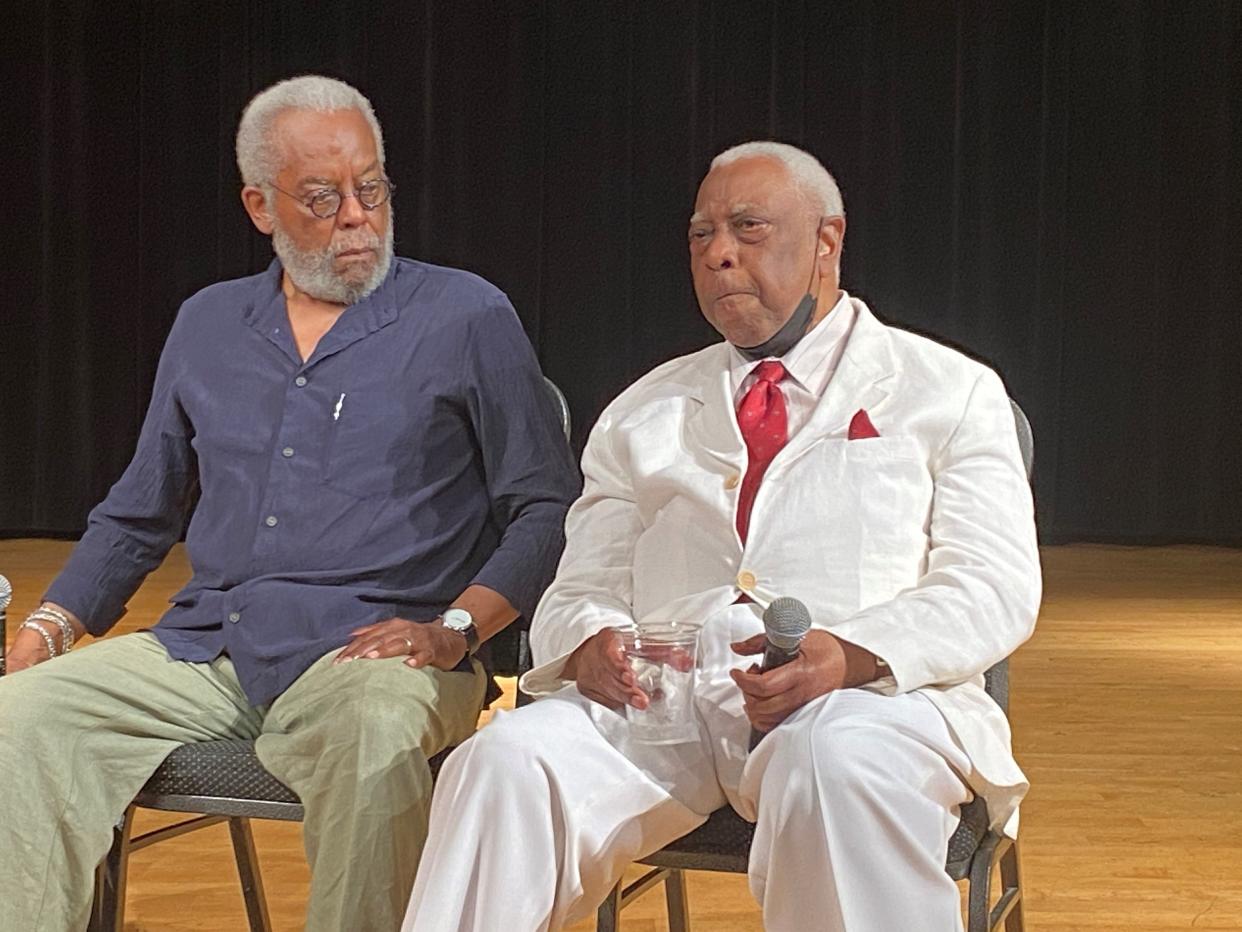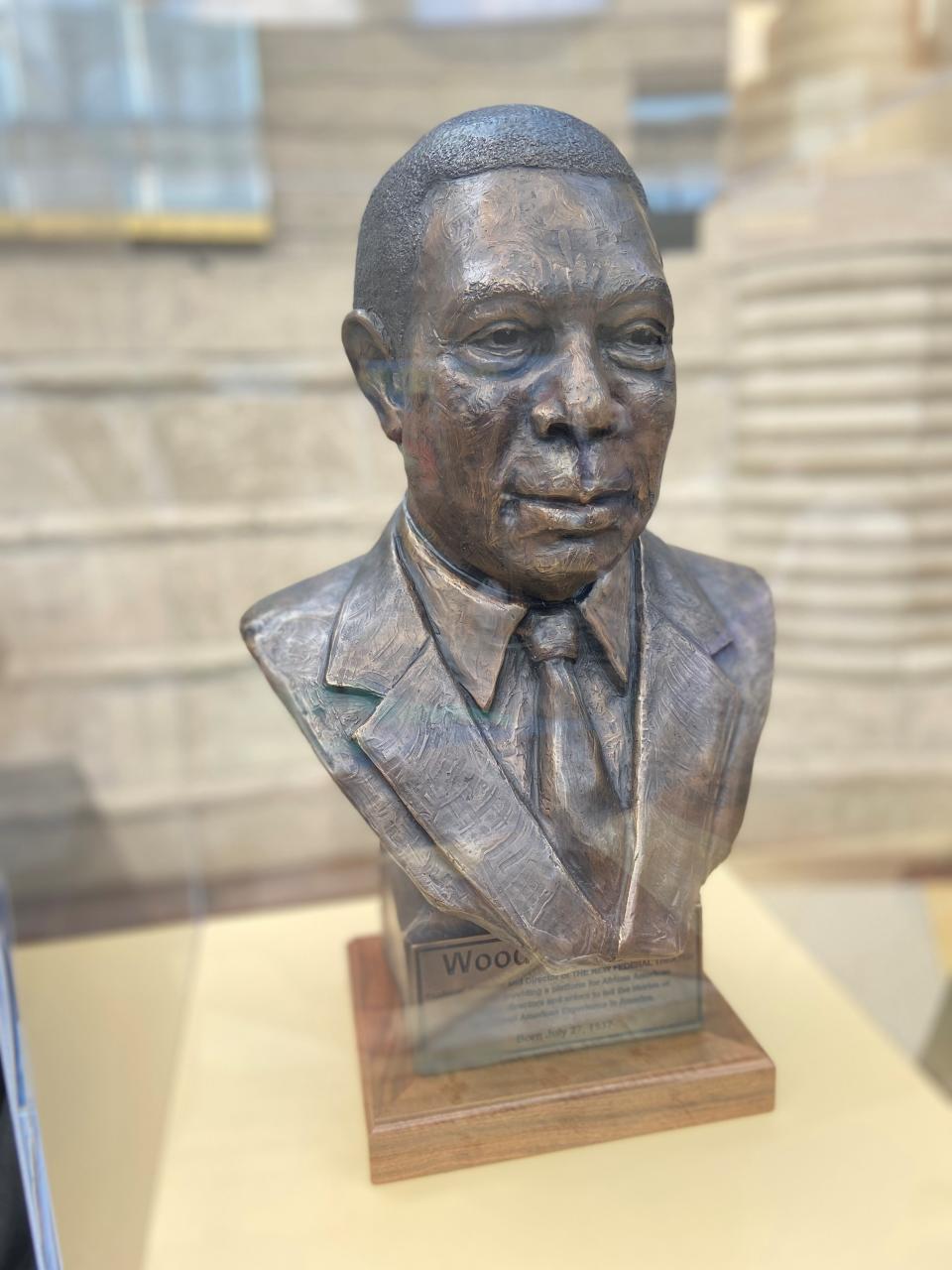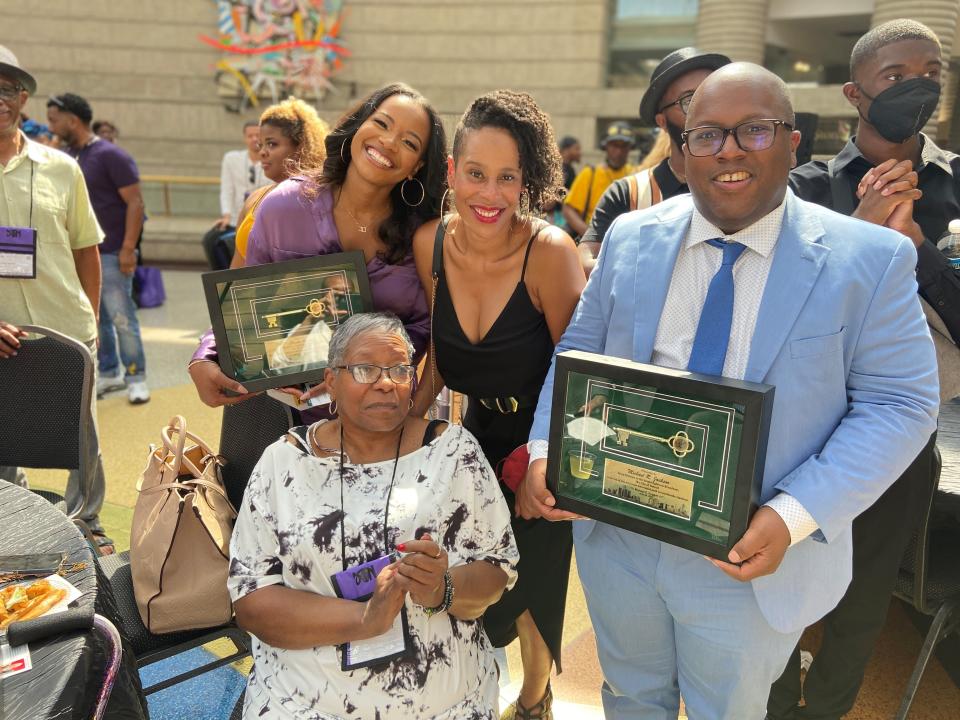Broadway Comes Home event honors Detroiters who have won fame on the stage

- Oops!Something went wrong.Please try again later.
Mayor Mike Duggan honored a host of Broadway luminaries on Sunday during a ceremony celebrating Detroit’s contributions to Broadway.
Held in the rotunda of the Charles H. Wright Museum of African American History, Broadway Comes Home to Detroit also served as the kickoff for the Black Theatre Network’s annual conference, held this year in Detroit.
The city’s Department of Arts, Culture & Entrepreneurship organized the event. The honorees were:
Michael R. Jackson, a Cass Technical High School graduate who received the 2020 Pulitzer Prize and the 2022 Tony Award for Best Musical for “A Strange Loop.”
Dominique Morisseau, a Cass Tech grad, award-winning playwright, MacArthur genius and executive artistic director of Detroit Public Theatre. She was Tony-nominated for her scripts for Temptations musical “Ain’t Too Proud” and Detroit-set drama “Skeleton Crew,” which garnered a Tony Award for actress Phylicia Rashad this year.
Ron Simons, a Detroit native and four-time Tony-winning producer and CEO of SimonSays Entertainment. His productions include “For Colored Girls,” “Jitney” and “A Gentleman’s Guide to Love and Murder.”
Ruben Santiago-Hudson, a Tony-winning actor, writer and director who spent formative years in Detroit during his youth. Nominated for the Tony six times, he directed the recent revival of August Wilson’s “Jitney” produced by Simons as well as Morisseau’s “Skeleton Crew.”
Chanté Adams, a Cass Tech grad and winner of this year’s Essence Ford Vanguard Award for Black Women in Hollywood. She had leading roles in the Netflix film “Roxanne, Roxanne” and “A Journal for Jordan,” and starred on Broadway in Morisseau’s “Skeleton Crew.”
Marilyn McCormick, a retired Cass Tech theater educator who received a 2016 Tony Award for Excellence in Theatre Education for inspiring generations of students to find successful careers in entertainment. Jackson, Morisseau and Adams count themselves among McCormick’s former students.
Woodie King Jr., a legendary director and producer of stage and screen and founding director of the New Federal Theatre in New York. He graduated from high school in 1956 in Detroit and worked for Ford Motor Co. and the City of Detroit before turning to the theater.
Duggan presented each of the honorees with a key to the city, and a bronze bust of King by artist Stan Watts was unveiled. The Wright Museum will be its permanent home. Coleman A. Young II also assisted in presenting surprise Spirit of Detroit Awards to ACE director Rochelle Riley and to the Black Theatre Network itself in honor of the occasion.

The Black Theatre Network also announced plans to open an office in Detroit to further its relationship with the city and to “elevate Black theater in the city.”
“It is so wonderful to be back home,” said the group's president, Detroit native K. Zaheerah Sultan. “There is nothing like the spirit of Detroit. We celebrate the creativity, the thrive-ability, the heart of Detroit. It’s very important for us to reconnect with this community and grow and thrive together.”
Santiago-Hudson spoke about the Motor City’s resilience during his acceptance speech, citing the city’s “never-die attitude” and willingness “to drive until the wheels fall off.”
"I'm honored and grateful to be back to my second home,” he said, “and I feel proud and pleased and filled with joy and grace that I can be the adopted son of one of the greatest cities in the world: Detroit. … It (means) the world to me. Because of the love, the power, the energy that you instilled in me, the grace that you’ve shown me, the generosity you’ve given me. … it changed the course of my career, and I stand here today grateful to you all.”
More: Broadway shows boast record number of Detroiters, prompting big New York City celebration
More: Detroiters take over a Broadway theater, celebrating the Motor City in New York
Simons recalled how his grandfather made the trek north from Statesboro, Georgia, during the 1950s to seek a better life.
"It's because of this city that no matter where I go, no matter what I do, no matter how I operate, I bring Detroit with me, because Detroit taught me Black excellence from the very beginning.”
Morisseau gave a sly grin when she began her speech.
"Even though acknowledgment is not something we always get,” she said, “we have to do this whether we get the acknowledgment or not. But this right here ... it's one I've wanted all my life. I care so much about this city that built me."
She also had high praise for McCormick, as did Adams and other former students.
“I never thought I would be here so early in my career, so this is an incredible honor,” Adams said. “I’m a little flabbergasted to be standing here in front of my high school drama teacher, the whole reason why I’m here. Honestly, this is for you.”

McCormick, who was not able to stand for her speech, spoke lovingly of her students..
"There was a time where I could not walk at all,” she said. “I didn't walk until I was 14 years old. And today, even though I am seated, I am soaring. I am flying with the eagles, and it's because of my former students."
King, decked out in a white linen suit, recalled the years before his work in New York changed the landscape for Black talent.
"When I graduated Cass Tech, there were no Black drama teachers," he recalled. "There were no Black artists being invited in. There was no place for Black artists.”
The theme for this year’s Black Theatre Network conference, Scripting the Flip, is a play on the phrase “flipping the script” and reflects how much opportunities have shifted for Black entertainers. Detroit native Michael Dinwiddie, an associate professor of dramatic writing at New York University, explained that a key event in the timeline took place in Detroit.
In 1922, famed blackface performer Bert Williams played a show at Detroit’s Garrick Theatre while very ill. He sweated profusely during his time onstage and his blackface makeup began to run, which audience members thought was part of the show. They laughed and Williams finally collapsed. The curtain fell to great applause, but Williams had to be carried away and died soon after.
“The last performance by the most famous blackface performer ever was in Detroit,” Dinwiddie said. “Blackface ended here. And later, we started to have Black empowerment in our theater scene here. The images that came from people like (playwrights) Ron Milner and Bill Harris gave us a way to see ourselves differently than the ways in which we’d been projected and presented in the culture. That’s scripting the flip, and we aim to do more of that.”
This article originally appeared on Detroit Free Press: Duggan honors Detroiters who have won fame on Broadway

